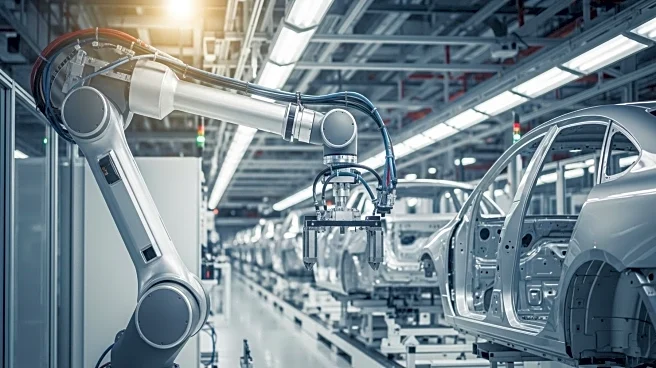What's Happening?
Hyundai Motor America is experiencing significant delays in the completion of its battery plant in Georgia following a federal immigration raid. The raid, which took place at the Hyundai-LG worksite in Ellabell, resulted in the detention of over 300 Korean workers. The investigation, initiated by the Department of Homeland Security, was reportedly linked to workplace safety issues, including three fatal accidents over two years. These incidents have raised concerns about the safety culture at the site, potentially exacerbated by the presence of undocumented workers who may fear reporting safety violations. The raid has disrupted operations, with many detained workers holding B-1 visas or entering under visa waivers. Hyundai's CEO, José Muñoz, indicated that the detentions would delay the plant's completion by two to three months.
Why It's Important?
The raid and subsequent delays at Hyundai's Georgia plant highlight the complex interplay between immigration enforcement and economic development. The plant is part of a broader $26 billion investment by Hyundai in the U.S., spurred by incentives from the Inflation Reduction Act. This investment is crucial for job creation and economic growth in Georgia, a state that has attracted significant South Korean investment. The incident underscores the challenges foreign companies face in navigating U.S. immigration policies, which can impact their ability to complete projects and meet economic commitments. The situation also raises questions about workplace safety standards and the treatment of foreign workers, which could influence future foreign investment decisions.
What's Next?
Hyundai and its partners are working to address the delays caused by the raid, focusing on the release of detained workers and ensuring compliance with safety and immigration regulations. The company is likely to face increased scrutiny regarding its workplace practices and the legal status of its workers. Political leaders in Georgia and South Korea are monitoring the situation closely, as it could affect future investment decisions and bilateral trade relations. The outcome of this situation may prompt discussions on balancing immigration enforcement with economic interests, particularly in states heavily reliant on foreign investment.
Beyond the Headlines
The incident at Hyundai's Georgia plant may have broader implications for U.S.-South Korea relations, particularly in the context of trade and investment. The raid highlights potential vulnerabilities in the U.S. labor market, where foreign expertise is often needed for specialized projects. It also raises ethical questions about the treatment of foreign workers and the responsibilities of multinational corporations in ensuring safe and legal working conditions. The situation could lead to increased advocacy for policy reforms that address these issues, balancing economic growth with worker rights and safety.








